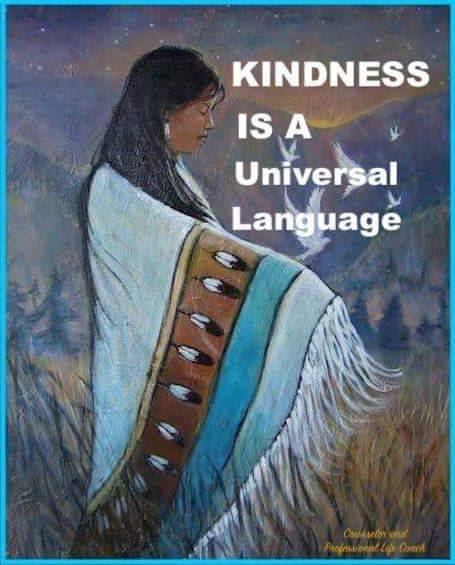#universal language
Note
What do you think would be the most practical if there were an official common language for global travel? Like, alphabetically, phonetically and grammatically speaking?

Mmmm... I'm afraid this is a question that people have been struggling to answer for well over a few centuries.
What you're asking is to create a universal Lingua Franca. A language that is simple to learn, easy for most people to pronounce, and has the potential of making global communication easier.
Well, the issue is that... asking that question is kinda like asking the question "Which color is the most universal color?"

I'm not asking for a witty reply here, so hold your horses before you type 'ultraviolet' or 'magenta, because it doesn't exist'.
The fact of the matter is, color (and language) exists on a spectrum much like this ever-looping ring of hues. They all have their specific properties, grammars, pronunciations, etc... but none of them are 'average', you know? It's not really a useful way to think about language.
In fact, people have been TRYING to invent this type of language forever - check out Esperanto, the one that has been around since 1887, and the other 500-some documented attempts (source).
But despite all these apparently 'universal' languages existing, they've universally never gotten very far. I bet you've never heard of most of them!
Why?
Well, for one thing, creating a 'common' or 'practical' language is a matter of subjective opinion. Practical for whom?
Esperanto is meant to be universal, but it's primarily based on Latin, and other European languages - romance languages, with some Germanic and Slavic words mixed in. That is to say - for someone who is a native speaker of a Bantu language like Swahili, it will be just as difficult to acquire as any other given European language. Similarly, no matter how 'universal' your southasian-based language is, someone who only speaks, say, Arabic, will still struggle to immediately communicate with it.
Just look at this list and you'll get a very quick sense of what language families these 'universal' languages tend to favor.

Now, I'm not saying 'wow, universal languages are bad, because people are using only western languages'. It's common sense, when you create a language, to draw on your own experience.
But it's very clearly not a 'universal' language if you lean too hard one way or another.
*If you want to learn more about this, I HEAVILY recommend the book In The Land of Invented Languages by Annika Okrent, which goes much deeper into this topic.
So can we meet in the middle?
With the way languages work, by and large, no.
There is no 'central' grammar - all languages are on a spinning ring of agglutinative or fusion languages, and recent research suggests that languages become more one or another naturally over time. Similarly, phonetics doesn't have a 'standard' phoneme set. Most languages tend to have a specific set of common vowels, but consonants are more tricky, and you cannot guarantee a set that'll please everyone.
And the problem is, because it's all on a gradient, there is no 'middle' to work towards. A universal language would be no language at all.

So... in conclusion... is there a practical language for global travel?
Yes! It's English.
Is it practical because it's easy to learn?
No.
Is it practical because it is 'phonetically accessible'?
Not at all. In fact, the opposite might be true.
But the fact of the matter is, English is a lingua franca because it's attached to political and corporate and economic power. And that, more than any practicality, moves it to the forefront.
..............
Anyway, actually there IS a somewhat universal language, but it's not one you can read. The most universal thing in the world would probably be this.
1K notes
·
View notes
Text
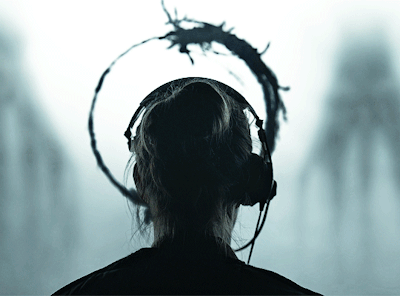

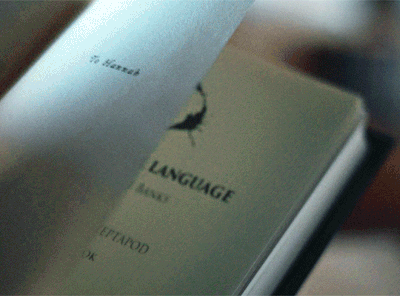
ARRIVAL
2016 | dir. Denis Villeneuve
27 notes
·
View notes
Text
Cincinnatian James Ruggles Created A “Universal Language” But No One Listened
Cincinnati in 1829 overflowed with excitement. Our little river town had grown to a total population of more than 24,000. General Andrew Jackson made a brief stop here as he journeyed up the Ohio River on his way to inauguration as President of the United States. Frances “Fanny” Trollope scribbled notes for what would become her scandalous exposé, “Domestic Manners of the Americans.” Over the course of a week, witnessed by thousands, Rev. Alexander Campbell of the Disciple Church defended Christianity from the assaults of Robert Owen, founder of New Harmony, Indiana, and fervid apostate, who argued that all religions were false.
Hardly noticed in all the hubbub was the publication of a slim volume by Cincinnati printer James Ruggles proposing the adoption of a universal language. In the intellectual ferment of the early Nineteenth Century, Ruggles’ proposal gained so little traction that he is all but forgotten today.
It is interesting that Ruggles had his book published by Cincinnati printers John McCalla and Samuel Davis, because Ruggles himself was a printer and a publisher himself. Born in New York in 1795, Ruggles married a woman named Henrietta Disher and relocated to Steubenville, Ohio and then moved to Cincinnati. While here, he published a magazine called Ladies’ Museum which, according to an advertisement [29 January 1831],
“Embraced in its general subjects, Original and Selected Poetry, Tales, Notices and Reviews of New Works, Natural History, Sketches of Biography and History, Reports of Fashions, occasional articles relating to the culture of Plants Fruits and Flowers, with such Intelligence, Anecdotes, chastened effusions of Wit, Sentiment, and Humor, as will impart variety and furnish an agreeable miscellany.”
Although not identified as such in the city directory, James Ruggles was also apparently a teacher of some sort, although whether he taught in a private capacity or in the nascent public schools of the city is unknown. In Isaac M. Martin’s 1900 history of the schools of Cincinnati, Ruggles is listed among the “Teachers Who Have Become Authors.”
Martin’s book lists only Ruggles’ “Universal Language” among his publications, but an 18 November 1829 advertisement in the Ohio Monitor revealed that Ruggles was trying to attract enough subscribers to publish a series of books titled “The American Literary Preceptor,” which he described as:
“A complete system of tuition for American youths, containing all the branches of learning necessary, in forming the education of an American citizen – commencing with the first rudiments, spelling, reading, &c. and including those proper, as the foundation of a complete scientific and ornamental education, suitable for fitting one to enter a profession, or any useful occupation; to be comprised in about 15 volumes.”
The advertisement for the textbook series – there is no evidence any of the books were ever published – boasted of Ruggles’ role as the author of the book on universal language.
So, what was the “universal language” developed by James Ruggles? And why was it ignored by pretty much everybody? To begin with, Ruggles’ universal language was almost impossible to read and equally impossible to pronounce. Here is a sample:
“Kertholson sjtilmagpxl fjnhxl lokzturs, deksztxns fakhornpxs, karfzturps vovszdxrap, punkzpurapsdux kirkztur, rolsilnxmszdxrapdui.”
That tangled mess of consonantal gibberish may be translated as:
“To ascertain the relative situation and size of places, references are made on maps to direction, or the points of a compass, and to latitude and longitude.”
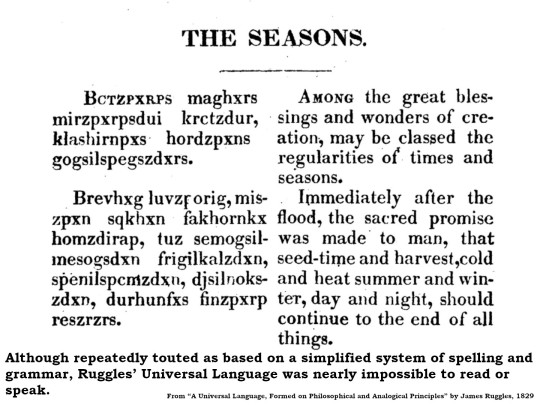
According to Ruggles, his universal language was superior to any previously proposed because it was:
“Founded on the clearness of its combinations – the simplicity of its construction, the uniformity and invariableness of its rules – and, especially, the facility and speed with which it can be acquired, of being universally adopted by the civilized world.”
The heart of Ruggles’ artificial language was simplicity. All plurals were formed by adding an s – none of this mouse/mice, goose/geese malarkey. Each vowel and consonant was pronounced uniquely to avoid homonymic rhymes like scoff-cough. Most root words were derived from Latin, so his word for “judge” was “prqt” from the Latin praetor, and his word for “stone” was “lap” from the Latin lapis.
Despite his obsession with simplicity and uniformity, the end result was so alien and complicated that none of the many literary magazines at the time paid it the slightest attention. Part of Ruggles’ problem was marketing. He never named his invention, referring to it only as “The Universal Language.” Later creators of Volapuk and Esperanto had better luck. Ruggles sent advance copies to scholars and celebrities, none of whom had anything particularly favorable to say about his Universal Language – but he published their responses in the back of his book anyway! Typical was this polite dismissal from John Quincy Adams, who found time despite his duties as President of the United States to respond on 27 July 1827:
“Sir: I return herewith, conformably to your request, the Plan of a Universal Language, which was enclosed with your letter of 28th May. An opinion long since formed, unfavorable to all projects of this character, has perhaps influenced that formed with
regard to yours. From the examination, necessarily superficial, which I have been able to give it, I consider it creditable to your ingenuity. Respectfully, your fellow-citizen.
J.Q. Adams.”
In other words, “I am opposed to the whole idea of a universal language, but your scheme indicates some level of imagination.”
For reasons unknown but probably involving money or the lack thereof, Ruggles uprooted his wife and sons and left Cincinnati around 1831. He reappeared in Edwardsville, Illinois near the banks of the Mississippi River in 1838 as the editor of a local newspaper with a decidedly unusual mission. According to the 1882 “History of Madison County, Illinois”:
“The Western Weekly Mirror was established at Edwardsville by James Ruggles in May, 1838. He was editor and proprietor. The Mirror was devoted to the introduction and propagation of a universal language by which the whole human family could hold converse with one another and be understood. It was a worthy mission, but the feeble effort of its progenitor fell stillborn. It continued until the spring of 1840, when its name was changed to the Sovereign People. It continued until the summer of 1841, when it suspended.”
James Ruggles died of congestive fever on 17 October 1844 in Edwardsville. He left no will, but his wife appealed to the local authorities to become adminstratrix of his estate, which she testified amounted to less than $300.
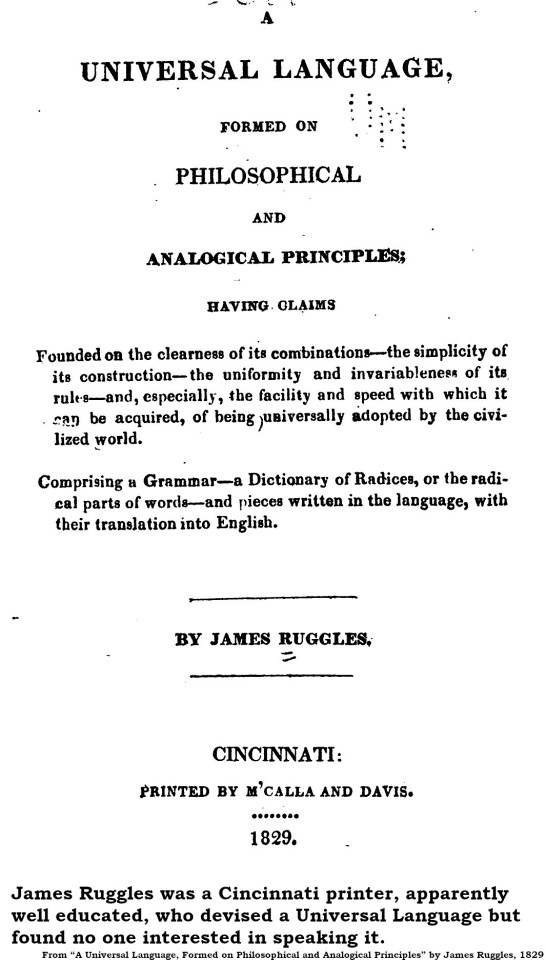
22 notes
·
View notes
Text
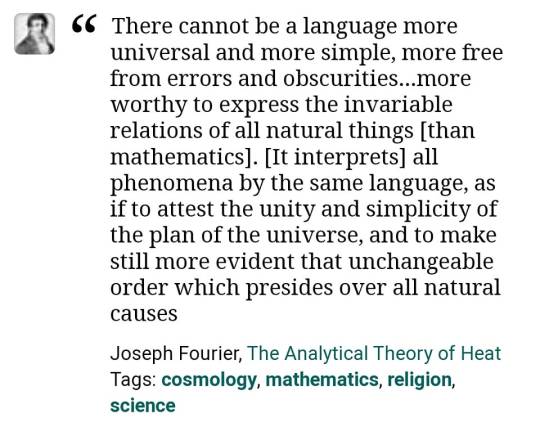
"There cannot be a language more universal and more simple, more free from errors and obscurities… more worthy to express the invariable relations of all natural things [than mathematics]. [It interprets] all phenomena by the same language, as if to attest the unity and simplicity of the plan of the universe, and to make still more evident that unchangeable order which presides over all natural causes."
-- Joseph Fourier, "The Analytical Theory of Heat"
#Joseph Fourier#math#mathematics#universal language#natural universe#woke math#2+2=4#religion is a mental illness
25 notes
·
View notes
Note
Ooh is there anything you can tell us about your original work? Or is it fully a secret for now :3c
Ahhhhh I have kept this story so hush hush for such a long time, it feels weird to even mention it online. I've been working on it since 2017, and its a work of fantasy, so the first few years was near exclusively spend worldbuilding. And its me, so i mean I built everything from the ground up, literally. I spent so much time watching geology micro-documentaries. Gathered info on ecology. Weather systems. Volcanology. Birds. Weasels. What would happen to the food chain if certain animals never evolved. if other kinds did. I made a whole planet and drew it and my husband framed it for me for Christmas three years ago.
The characters are most of the way there, as are their growing bonds and dynamics. Its been fun to make OCs and really dig into them in a way I don't have time for in fanfic. I love them all very very much. To no one's surprise there are lots of children. The story will be much like Issho and Nightjar in that the story is child-centric, but not necessarily a children's novel. It'll be a bit long and a bit too in depth on some sensitive topics for it to be "for kids" specifically, but I'd never stop a kid from reading it.
The plot is... still very much in construction mode. I make wild changes nearly every day and my friends who are in the know about the story can barely keep up. But they all feel like changes in the right direction! So its a very exciting time. I'm soaking in the spring air and going wild with creativity. Its been YEARS since I made progress like this. Maybe unprecedented amounts of work being done.
Would you believe its Gay Dads and their Three Adopted Children With Issues?
#its not just my post manga terumob fics i promise#extremely different people#entirely different planet#there are spirits and curses and blessings and mystery#not going to lie two of the children WERE based loosely off Benjiro and Mihoko#but i changed enough over the years that they have become their own people#if anyone wanted to see the Beta Version of the planet you could go read my Tsubasa fic#Universal Language#hiiiiiii mintberry#thank you for asking I AM SO HAPPY TO SHARE even if its just a little#i can definitely answer more questions!#i am just going to keep the specifics like names and plot elements to myself#I'm weirdly paranoid about this getting stolen for some reason'#toasty answers
3 notes
·
View notes
Text
OKAY IT’S FINALLY TIME I LET MY PERSONALIZED COPY OF AUTISM FLAIR UP ON HERE (lmao).
Whenever I think about portrayals of universal language or a “language of earth” it always seems to be a spoken language which… seems really really stupid to me??
Language evolves SO fast, thus creating a spoken language out of combinations of existing languages would be nearly impossible, as all languages with a large group of primary speakers has become inundated with slang relevant to only the generation or even specific group within a generation that uses it.
Creating a language from scratch is also incredibly hard as even though it’s already been done none have been adopted because (in my opinion) they skew one way or another when it comes to linguistic familiarity to existing languages and their concepts.
So what about a language that isn’t spoken? A pictographic (picture) language consisting of universally recognized depictions of any human concept?
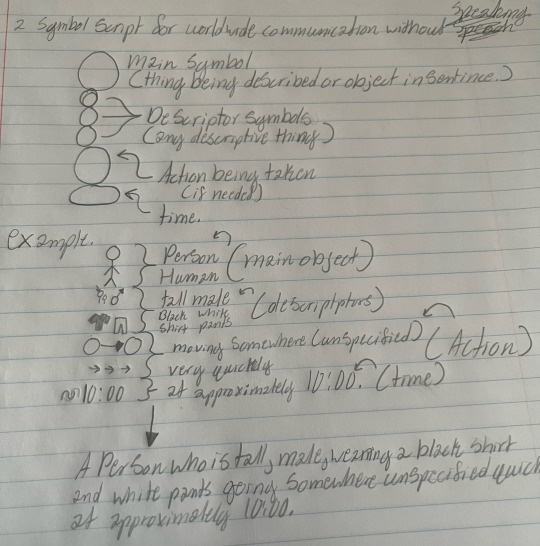
This is a VERY rough showing off how this might work, but an idea I had was to simply use symbols and sub symbols in different places in relation to each other to depict things around us!
The structure would be simple to understand, with 4 main parts for this short example!
Your “main object” would be the symbol at the top, this is simply a part of the sentence you are conveying to the other person! This could be anything from “person” to “bookshelf”!
Your “Descriptors” would be smaller symbols underneath the main symbol in up to 4 columns and as many rows as needed, anything from the color of the object, its height etc! Some of these symbols may need to be complex within themselves, as in a symbol of a shirt may need to be colored the color that it is instead of needing another descriptor to describe it for simplicity.
Your “Action” would be the third symbol, the same size as the “main object” symbol as it can also be described! While not present in my above image above in that way, this would make the most sense in my mind!
After that there could be any number of symbols for additional information, but specific pieces of additional information may be written in specific ways, in this example our “time” aspect is written across 2 columns and one row like the common digital alarm clock.
As for the example I depicted in the image above in pencil, I drew a stick figure depiction of a human as my main object, with a depiction of two stick figures, one short and one tall, with an arrow pointing towards the taller depiction alongside the commonly recognized symbol for a personal born male in the first row, with a shirt symbol colored in black and an uncolored pair of pants in the second row. The third row is an image of a circle with an arrow pointing towards another circle with three small arrows beneath it, with “~10:00” written below it!
All and all if my example makes sense this should roughly be understood as “A person who is male, tall in stature, wearing a black shirt and wearing white pants moving from somewhere unspecified to another unspecified location very quickly at approximately 10:00”!
Okay idea dump (info dump?) over lolz :P
4 notes
·
View notes
Text
dashboard is just music posting now and I’ve never seen such beauty
6 notes
·
View notes
Text
This blog is dedicated to my WIP conlang, Plamanetan. (That name is temporary and will probably change throughout the project. I will update this post whenever I change it.) The main purpose of this blog is to get feedback via polls as I work on the project. Any detail about Plamanetan that I post on this blog is subject to change until I finalize the project.
If you are interested in the details of Plamanetan, I will go into detail below the cut. Thoughts and feedback are appreciated but not required :)
A couple notes:
I currently only have 23 words in the vocabulary and am just starting the process of applying new formation guidelines to them so they might all change. For that reason I am not including any specific vocab in this post.
The grammar is VERY loosely defined at the moment because I am still trying to nail down the best approach to it.
Goals & Inspiration
Plamanetan is intended to be an International Auxiliary Language. I started it because 1) I have wanted to make a conlang for a while now, and 2) While watching Conlang Critic I heard him say that he doesn't think an Auxlang can be good (or something to that effect) and I took that as a challenge.
Is that the best motivation? Probably not. But it has gotten me to stick to this project longer than I have stuck to any previous conlang project.
To be more specific about my goals here is a bulleted list of specific targets I have made for myself:
Keep the phonology simple and use sounds that are common across languages.
Avoid loaning words directly from existing languages (to keep cultural neutrality and to avoid bias toward any particular language or language family). (Exceptions may be made for things that are well known by a specific term, if that seems like the best thing to do in that scenario. Probably would only apply for very modern technology or concepts whose terms have been coined recently in a specific language and then adopted around the world.)
Make words sound representative of the thing they refer to by using things like Onomatopoeia and the Kiki/Bouba effect whenever possible (This is the most challenging goal so far)
Be minimalistic with the grammar that is required, but keep in easy workarounds to communicate information that would be lost by omitting a particular feature (For example, making adjectives for male and female for speakers who are used to denoting the sex of living things with grammatical gender.)
Use nouns as a base and derive all words of other types from them using suffixes. (To decrease the amount of vocabulary that has to be memorized without limiting what can be concisely expressed.)
I also intend to eventually create a corresponding sign language with the following goals:
Can be signed with a single hand (To make it more practical to use even if you are holding something.)
Be a 1-to-1 match of the spoken language (so that spoken and signed versions can be used simultaneously without much effort, and so that the signs can be a visual tool for deciphering spoken words you don't recognize.)
The only reason that I haven't started on the signed part yet is because I don't know exactly how to approach it, considering I do not speak any sign languages. I think it would benefit the project though, so I am keeping it in my goals list. I'll learn some ASL before I try to tackle that part.
Phonology & Orthography
So currently what I have is this:

(Ignore the pink "a," that's just because it was added later.)
IPA symbol on the left, Latin alphabet in the brackets. I chose to use the Latin alphabet because it is the most common writing system and also because its the only one I can type.
I came to these sounds by:
Using a very messy not-really-criteria criteria to pick 15 source languages across various language families. (Lithuanian, Russian, English, German, Hindi, Bengali, Spanish, Mandarin Chinese, Swahili, Yoruba, Arabic, Hausa, Somali, Indonesian, Malay)
Going through the wikipedia page for each language's phonology and writing down all the sounds on the chart.
Making a list of all the sounds that showed up in at least 2/3 of those phonologies.
Picking sounds from that list while avoiding voicing distinctions and any sounds that seemed a little too similar too another sound.
As for punctuation, its pretty much just English. Period (.) to end a sentence, comma (,) to separate clauses, quotation marks ("") for quotes and dialogue, exclamation point (!) for exclamations, and a question mark (?) for questions (though I plan to add a question particle so that may be redundant). I'll edit later as I get a clearer structure for the grammar.
Phonotactics
I decided that syllables in Plamanetan will have a ccvc structure. The only restrictions on what can go where are in regards to consonant clusters in the onset.
I allowed for consonant clusters at the start of syllables to give myself a little more flexibility in word formation. I chose the permitted clusters based purely on what I personally think are relatively simple sound combinations because I cannot for the life of me find documentation on this topic for any of the source languages. Its pure guesswork which really isn't good for my goals but its the best I got. Anyway, here's my list of permitted consonant clusters:
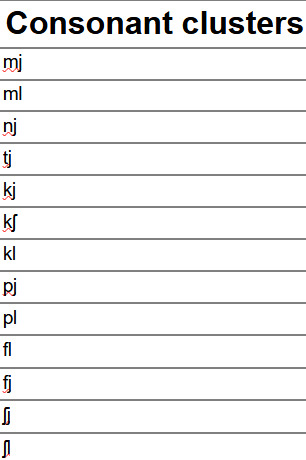
I originally had a list of diphthongs with this but decided to remove them so that I can write vowels next to each other without confusion. They weren't that necessary and I think its easier without them.
Also, not sure if it belongs in this category but Plamanetan words have an alternating stress pattern starting with the first syllable. so like Plamanetan.
Grammar
As I mentioned before, the grammar is the least developed part of this language so far. Or at least, its the part that feels most incomplete to me because I'm not very satisfied with it yet. And also my personal notes on it are very messy.
First thing I decided on was word order. I chose SVO as the primary word order because it was the most common among the source languages. Originally I wrote that the SVO order would be very strict, but I think the fact that different word types have different endings may allow for some flexibility. I also decided that words that modify a noun or verb should come after the thing they modify (like in Spanish) rather than before (like in English). I don't remember if I had a reason for that choice.
As stated in the goals, I have chosen to base the entire vocabulary on nouns. Every non-noun word must correspond to a noun of an equivalent or at least related concept. These words are formed by adding suffixes.

I'll probably make some exceptions to this rule for conjunctions and adpositions unless I can come up with a creative way to implement them. Because I don't think that the "add suffix, now you're done" method works very well for these words. Maybe adpositions could be treated as adjectives? I'll figure it out later.
(You may also notice that this is very regular. No exceptions to grammar rules. This is on purpose because it makes the language easier and I have no intention of making this naturalistic.)
I decided to omit verb conjugations and instead have time information be communicated by adding words like "yesterday," "tomorrow," and "5 minutes ago." If time is necessary it can be added to the sentence. My logic here is that its easier to not require a grammatical distinction by making the information optional than it is for someone whose language doesn't have this grammatical distinction to be required to learn it. But if I find a good reason why it would be easier or more intuitive to add tense then I will do so.
^Same concept applies to other grammatical features such as gender, plurality, possession, mood, and evidentiality. Its easier not to require speakers to figure it out if their language doesn't have it. My only concern is that this will over inflate the sentence size and make it hard to follow what is being said. If you're interested enough to have read this far, I would love to hear your thoughts on this because I am truly torn on whether or not this is a good idea.
Word formation
And finally, the most recent thing I have added is a rough outline of how I intend to make words sound like what they mean. I may make edits to this process in the future but for now this is the system I am running my vocabulary decisions through. Most of this is based on what I intuitively think sounds best for these concepts so it may be English-speaker biased. But there's not really a lot of actual information out there on this topic for me to pull from so this is the best I've got.

As you may be able to tell if you squint, this is the part that I tried to derive from the Kiki/Bouba phenomenon. I'm not sure if I fully understand how it works (I mean, no one fully does. But as far as whats known I am unsure,) and I also made up some of my own things. But hopefully this system has the desired effect. I'll test with polls as I go to see if people can accurately guess what a word is supposed to mean based on its sound.
----------
If you read this far, thank you! I'm glad someone found this interesting! If you have any thoughts, questions, or suggestions I would love to hear them.
I hope you stick around!
#Conlang#WIP#language creation#conlang critic#jan misali#universal language#grammar#linguistics#language#conlanger#conlanging#personal project#work in progress
2 notes
·
View notes
Text




There's a language between trees and sunlight, flowers and bees, wind and leaves, sea and sky, which I think we all should speak to each other.🍀
.
58 notes
·
View notes
Text
"Loving you has to be THE most comfortable feeling to ever exist in this universe.."
Love is the fabric that holds the universe together, so loving you only comes natural - eUë
#natural#universe#loving you#comfortable#feelings#affection#affectionate#thinking#pondering#think thonk#i love you#universal love#universal language#universal#love langauges#love language#in love#falling in love#fall in love#fell in love#spilled ink#spilled thoughts#spilled words#love quotes#love#love quote life quotes#love quote for her#quoteoftheday#romance#romantic
45 notes
·
View notes
Text
Coffee. Seen in Prague. The universal language.

#coffee#prague#MLS Coffee#european city#europe#vieformidable#follow vieformidable#food#drink#caffeine#universal language
3 notes
·
View notes
Text
Really kicking myself for not saving comfort fics before they were deleted
#universal language#by#tinyduck#was legit so good and i was actually illjstrating each chapter just as a fun thing#but then they got legit super stalked and sent anon hate so bad they had to nuke everything#i hope theyre okay#and that the ppl who did that to them get a life lmao
2 notes
·
View notes
Text
Unlocking the Mysteries of Angel Number 333
A Sign of Divine Guidance
Have you ever experienced a moment where you repeatedly encounter the same number, almost as if it’s following you? Many believe that these occurrences are not mere coincidences but rather messages from the universe or, more specifically, from angels. One such number that holds profound significance is 333.
The Meaning Behind 333
Alignment with the Universe: Angel…

View On WordPress
#3#333#angel numbers numerology#love#Number 3#numerology#NumerologyInsights#NumerologyMeaning#positivity#universal language
1 note
·
View note
Text
Music is my passion, but it’s our language…
As far back as I can remember, it was always my dad and I, on the Road, music on the radio. Gas in the tank, and no place I’d wanted to be more. You just couldn’t stop us from bonding. I look back at it now, and it was the music that we had. It was music that we used to communicate. You can instantly feel the kind of mood someone is by their rhythm. And if you can’t hear or feel someone’s rhythm,…
View On WordPress
#beat of my own drums#life is a song sing it up#little drummer soilder#love music love life#universal language
0 notes
Text
Unlocking the symphony of emotions, Augusto César Alarcón Jiménez, a UNAM maestro, reveals the magical mission of musicians – inducing relaxation. As International Musicians' Day approaches on Nov 22, let's celebrate the universal language that transcends cultural boundaries.
#symphony#emotions#musicians#relaxation#International Musicians' Day#universal language#music#orchestra
0 notes
